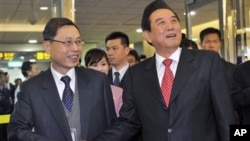China's top negotiator with Taiwan is visiting the island. His schedule includes business meetings that could lead to more investment in Taiwan as well as political gains. Still he may run into of protests this year, as he did during two previous visits.
Chen Yunlin Scores of Chinese working on Chinese-funded oil fields, and rail and telecommunications projects have also been attacked by armed looters and robbers.
Chen is the chairman of mainland China’s Association on Relations across the Taiwan Strait. On previous visits, he and Taiwan negotiators broke down decades of political tension by forging new trade links.
After Taiwan President Ma Ying-jeou was elected in 2008, the two sides agreed to talk twice a year and Mr. Ma’s effort to engage Beijing has opened up more trade and tourism across the Taiwan Strait.
His trip this time is expected to focus tightly on business.
Raymond Wu is the managing director of the e-telligence Research and Consulting Group in Taipei. "He wants to explore the investment opportunities and he brought something like 40 top business executives from China. That is the first big difference about his trip this time. And second is, he is making the first official visit by a high Chinese representative into the south part of Taiwan," he said.
China’s companies complain that Taiwan does not give them enough access.
Taiwan companies have long invested in China to take advantage of cheap labor. But because Taiwan leaders do not want the island’s economy too dependent on China, they severely limit what Chinese companies can do on the island.
Taiwan’s populous and industrial southern region is more hostile toward Beijing than the north. Chen’s stops in rural Chiayi and the industrial port city Kaohsiung, both in southwest Taiwan, are expected draw protests.
Taiwan has been separately governed since Nationalist forces fled there in 1949 at the end of China’s civil war. The mainland’s communist government claims sovereignty over the island and insists that the two sides must eventually reunify.
However, many people in Taiwan prefer a degree of autonomy for the democratic island, and some in the political opposition favor outright independence.
Shane Lee, a political scientist at Chang Jung Christian University in Taiwan, thinks Chen hopes to learn more about how people in the south perceive China.
"Maybe he's just coming to get the feeling of how people in the south feel about China and about his visit. It's just to show he's not ignoring the south," Lee said.
Police are likely to be on guard against any incidents since Chen's 2008 visit sparked several days of occasionally violent protests.
Taiwan's main opposition, the Democratic Progressive Party, says it will not organize protests this time since the Chinese official has only private business on his agenda.
Chinese Official Seeks Business, Friends in Taiwan Despite Risks




